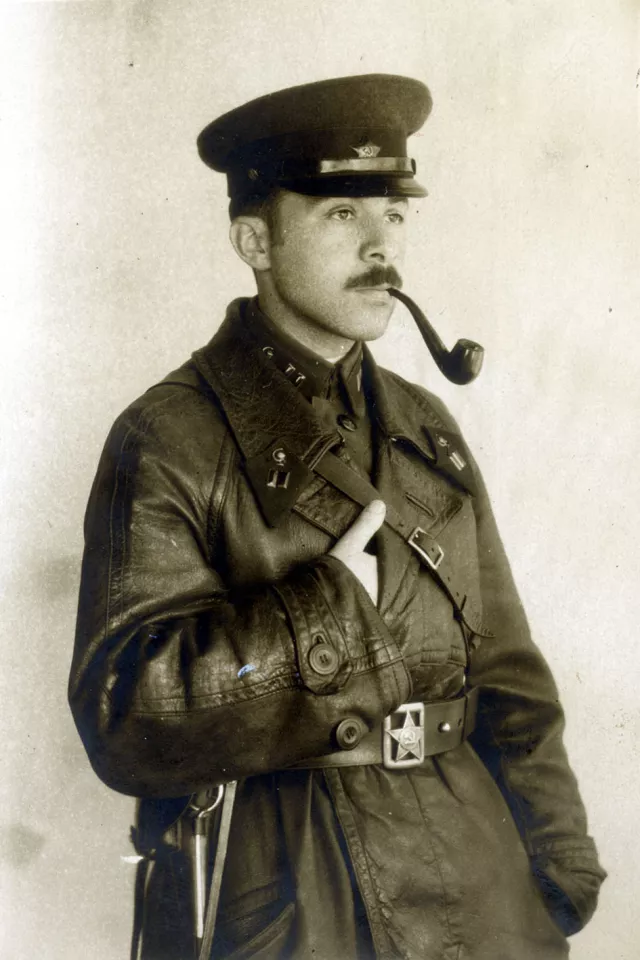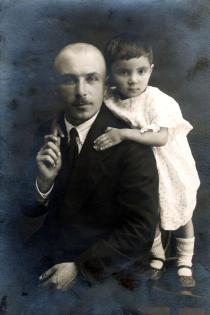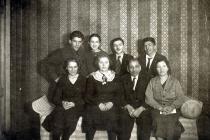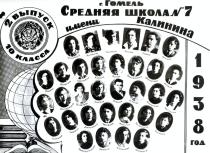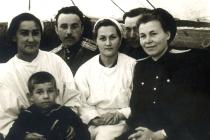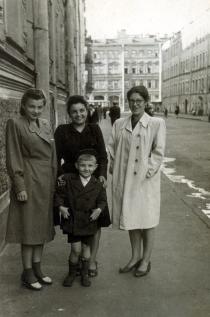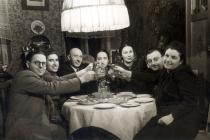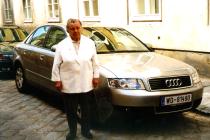Emma Balonova’s husband
This photograph was taken by a brother-soldier of my husband in 1943 in Leningrad region.
My husband was at war from the very beginning to the very end of it. But the rest members of our family also had to suffer the toils of war.
I finished 2 courses at my College, and the war burst out. On July 19, 1942 the College was evacuated to Kazan, we studied and worked there. Some faculties organized production of saccharin.
As for me, I worked at the faculty of pyrotechnics; there we were engaged in getting of phosphorus. It was a harmful and dangerous process. Every day I received a small amount of butter and 2 spoons of granulated sugar. It supported my organism a little.
In general, we lived in poverty. For dinner they gave us 2 spoons of mashed peas (we liked it very much). We added there an onion and ate it with a piece of brown bread. We received worker's cards, therefore it was impossible to die having 800 g of bread a day.
Every Sunday together with my friend we went to the market and bought half a kilogram of potatoes, boiled it, ate and drank the water. Till now I can't permit myself pouring out water, where I had boiled potatoes.
So, we lived that way, but it couldn't be helped! In Leningrad people starved more. We knew it for sure, because a lot of us had relatives there…
Winters were very hard in Kazan. And we had almost no clothes to put on. The Kazan girls had valenki. [Valenki - winter boots made of milled wool.] And so we wore those valenki by turns. I was lucky: I had a winter coat with me.
When we were at the railway station going to leave for Kazan, my mother-in-law almost threw it in my hands by force. I remember that I was very indignant at it 'It is summer now, the war will be finished in 3 or 4 months, why should I take it with me?'
And she answered 'If you don't need it, give it somebody as a present. And now take it please, don't refuse, do as I ask you.' So I took it, because it would have been in bad taste to refuse. Till now I cannot understand, how she managed to find me that day at the overcrowded railway station. She also brought me a wadded blanket.
It is incumbent upon me to mention that in Kazan we were received very well, though a lot of colleges were evacuated there. We never heard a word of reproach, while in fact not everywhere evacuated people were met affably.
We were lodged in the large basement of Kazan Chemical and Technological College. They placed there a hundred beds and a hundred bedside-tables. It was very warm there, that's why I did not unpack my blanket.
In 1943 or 1942 they sent us to dig entrenchments [during the war all people able to work were mobilized for earthwork construction around the cities].
At that moment I called my blanket to mind and took it with me. We were lodged in a premise with an earthen floor and I decided to unpack my blanket. I undid the package and saw a blanket in a snow-white blanket cover. And you see, the blanket cover was beautifully embroidered.
Well, the girls saw it and immediately nicknamed me Countess Balonova. They called me Countess all the time we were together.
My parents and sisters were evacuated in Gorky [Nizhniy Novgorod at present]. At the beginning of the war people lost each other, nobody knew where their relatives left for. Only later we gradually began to learn about the destiny of our relatives. I
n Gorky my father died. He caught a cold, because they left in haste practically without clothes and had no money to purchase winter clothes. His disease had lung complication and he died of pneumonia, because it was impossible to get penicillin at that time.
And my younger sister served in the army. She was mobilized as soon as they arrived in Gorky. She served all the war long, and after the victory day they got aboard big lorries and started eastwards. In their battalion there were only women.
They all thought they were going to be demobilized. But they went on moving eastward through Moscow, through Urals, through Siberia. When they understood that they were not going home, they started shouting, crying.
It appeared that Japan drifted into war. So my sister had enough time to fight there till the end of the war. She was there together with her future husband (he was their commander).
And my husband's family remained in the besieged Leningrad. He managed to help them bringing food, because he served nearby. His sister Maria served in the same medical unit.
One day he brought his mother a pork chop, and she said 'Isaac, I never ate pork, so do you think now in my old age I shall eat it? Don't feel hurt, but I won't do it.'
She was very courageous and did not allow her relatives to lose heart. She forced them to get up in the morning, did not allow them to go to bed in the afternoon, and made them change linen and wash whenever it was possible.
